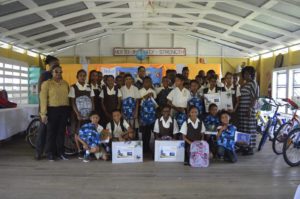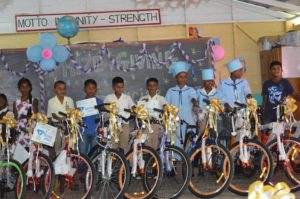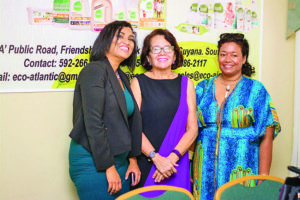
For Miranda Thakur-Deen education is a prized possession and to be in a position to aid someone to realise his or her full potential makes her extremely satisfied. Miranda hails from the island of Wakenaam in the Essequibo River and credits her humble beginnings to the success she has achieved.
She remembers growing up in poverty and having to walk long distances to school as well as not having the luxury of a television in the home. It is those struggles coupled with the push of her parents that led Miranda to appreciate the very little things one takes for granted. For most of her adult life Miranda has been giving back to her community in 
whatever way she could have afforded, but in 2008, those efforts intensified.
In 2008, Miranda, along with her husband and siblings, ventured into the mining industry and saw some amount of success. They then began intensifying their charitable efforts on the island of Wakenaam. It started with providing Christmas presents to the children on the island and then graduated to awarding top performers with educational grants and scholarships.
“About eight years back, we decided to go back to the primary schools and we decided to buy a bicycle for the top student. We then bought a laptop for the top students and that is where we started and because we were fortunate we continued doing it. That is where I was inspired to start a foundation. In 2015, I asked friends who shared the same vision if we could open a foundation and there it was we birthed Give Another Chance Foundation [GACF],” she said.

GACF is committed to helping provide basic education from pre-school to university and health care to underprivileged children in rural and urban communities. It is the belief of the organisation whether you are addressing healthcare, poverty, population control, unemployment or human rights, there is no better place to start, than in the corridors of education. According to the GACF Facebook page, the vision is to provide children and young adults with the building blocks for a better future.
“Our main aim is to provide them with the necessary resources and tools to ensure that every child is given the chance to evolve into a productive citizen.”
Miranda says that it is her humble beginnings that she credits much of her work to. She stressed that the GACF was not only working in Wakenaam, as it has been assisting the community of Baramita in Region One (Barima-Waini) ever since they started mining in that area. Additionally, they have expanded their services to almost every community in the country.
“I want to give people a chance to excel and give them the hope they need to push forward. We believe that a proper education is the key to addressing a number of issues in our communities.”
Currently, the GACF has been giving out a number of educational grants and back-to-school backpacks and is even paying the tuition fees for a student at the University of Guyana. Miranda says she hopes to provide three yearly scholarships to the University of Guyana among other assistance.
The GACF has persons from various disciplines on staff in order to tackle issues in a number of areas to better equip communities to find long-term solutions to poverty through innovative education and livelihood projects, which empower an individual to earn a livelihood. Its goal is to increase awareness on a range of issues – from health care to appropriate social behaviour to understanding one’s rights, and in the process help persons become better citizens.
Miranda says that the Foundation’s Board of Directors is committed to the financial, operational, and intellectual vitality of the organisation. The Foundation works on self-reliance projects where its education programmes focus not just on access, but on attainment – ensuring vulnerable children have the right infrastructure, resources, teaching and parental support in order to have a quality education so that they go on to lead productive, happy lives. This is complemented by the Foundation’s livelihood programmes that work to create secure incomes. The organisation also helps to improve agricultural practices and market awareness in farming communities. (Sunday Times Magazine)



